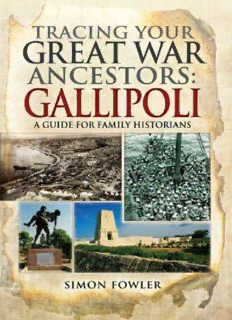
Tracing Your Great War Ancestors : The Gallipoli Campaign : A Guide for Family Historians PDF
Preview Tracing Your Great War Ancestors : The Gallipoli Campaign : A Guide for Family Historians
First published in Great Britain in 2015 P E N & S W O R D F A M I L Y H I S T O R Y an imprint of Pen & Sword Books Ltd 47 Church Street Barnsley South Yorkshire S70 2AS Copyright © Simon Fowler, 2015 ISBN: 978 1 47382 368 6 EPUB ISBN: 978 1 47385 188 7 PRC ISBN: 978 1 47385 195 5 The right of Simon Fowler to be identified as Author of the Work has been asserted by him in accordance with the Copyright, Designs and Patents Act 1988. A CIP catalogue record for this book is available from the British Library. All rights reserved. No part of this book may be reproduced or transmitted in any form or by any means, electronic or mechanical including photocopying, recording or by any information storage and retrieval system, without permission from the Publisher in writing. Typeset in Palatino and Optima by CHIC GRAPHICS Printed and bound in England by CPI Group (UK), Croydon, CR0 4YY Pen & Sword Books Ltd incorporates the imprints of Pen & Sword Archaeology, Atlas, Aviation, Battleground, Discovery, Family History, History, Maritime, Military, Naval, Politics, Railways, Select, Social History, Transport, True Crime, Claymore Press, Frontline Books, Leo Cooper, Praetorian Press, Remember When, Seaforth Publishing and Wharncliffe. For a complete list of Pen & Sword titles please contact PEN & SWORD BOOKS LTD 47 Church Street, Barnsley, South Yorkshire, S70 2AS, England E-mail: [email protected] Website: www.pen-and-sword.co.uk CONTENTS Preface Dardanelles or Gallipoli? Chapter 1 Gallipoli – an Overview ANZAC LANDING Chapter 2 Soldiers’ Lives SCIMITAR HILL Chapter 3 Getting Started DEATH AND THE FLIES Chapter 4 Researching British Soldiers and Sailors LANDING ON GALLIPOLI Chapter 5 Researching Units WAR DIARY, 2ND BATTALION, SOUTH WALES BORDERERS, 24–5 APRIL 1915 Chapter 6 The Royal Navy Chapter 7 Researching Dominion and Indian Troops Chapter 8 Visiting Gallipoli Bibliography PREFACE There is no other way to put it. Gallipoli was a disaster from beginning to end. On paper at least, the campaign should have been winnable, but in the event the only thing that went well was the final evacuation. The reasons why it was such a disaster have long been debated by historians, and include poor commanding officers, insufficient training and preparation, a lack of resources – ammunition, hospital beds and even water – and also a lack of will to succeed. There were also many missed opportunities and a lot of bad luck. Overall, the campaign showed how the British and, to an extent, their French allies had failed to grasp the realities of modern warfare. The landings at Anzac Cove and V Beach on 25 April and the attempts to break out from Anzac in early August were undoubtedly heroic but, without adequate artillery fire to destroy Turkish positions, flexible leadership by junior officers and proper preparation, they proved extremely costly in lives and materiel and ultimately they failed. It took two more years of bitter losses on the Western Front before the Allied commanders worked out a way to win. Whichever way you look at the campaign, the heroism and the fortitude of the Anzac and the Tommy on the ground, who endured dysentery, drought and disaster with remarkable fortitude and great humour, are undeniable. Conditions here were every bit as bad as anywhere on the Western Front, and sometimes even worse. This short book is designed to help people researching the men and the units who fought at Gallipoli. It does not go into detail about the battles or the strategies of the commanders, as there are numerous books that do this to a greater or lesser degree. A list is given in the bibliography. Instead, this book is arranged by sections offering guidance on researching the service personnel, the units and the actions themselves. There is considerable overlap between the sections, so readers may need to study them all to obtain a full picture. In addition, there are sections concerning life in the trenches and offering guidance for tourists, describing the key cemeteries, museums and other important attractions. An Australian field gun battery taking a break. British plans were severely hampered by the lack of artillery to destroy Turkish positions. If possible, readers should really visit the Dardanelles to see at first hand where the fighting took place. Here, perhaps even more than on the Western Front, the sacrifices made by the British, the Australians and all the other men on both sides can be better appreciated. DARDANELLES OR GALLIPOLI? T he campaign at Gallipoli is sometimes referred to as the Dardanelles campaign. Although there is some overlap, ‘Gallipoli’ can be taken to refer to those events that took place on land, and ‘Dardanelles’ to the less well known events at sea. This is how I use these terms in this book. However, contemporary papers often refer only to the Dardanelles, so in searching for material you may need to look under both terms. A minor further complication is that the Allied forces were part of a Mediterranean Expeditionary Force (MEF), and occasionally records may be found under this heading. By end of 1915 the MEF had also become responsible for the Allied forces in Salonika and, later, around the Suez Canal. Initially Lord Kitchener, the Secretary of State for War, wanted the Mediterranean Expeditionary Force to be called the Constantinople Expeditionary Force, until Sir Ian Hamilton, the Force commander, pointed out that the name was too much of a give-away, noting in his diary ‘I begged him to alter this to avert Fate’s evil eye.’ The Turks describe the whole sorry farrago as the Battle of Çanakkale or the Çanakkale Sava i. ș
Description: